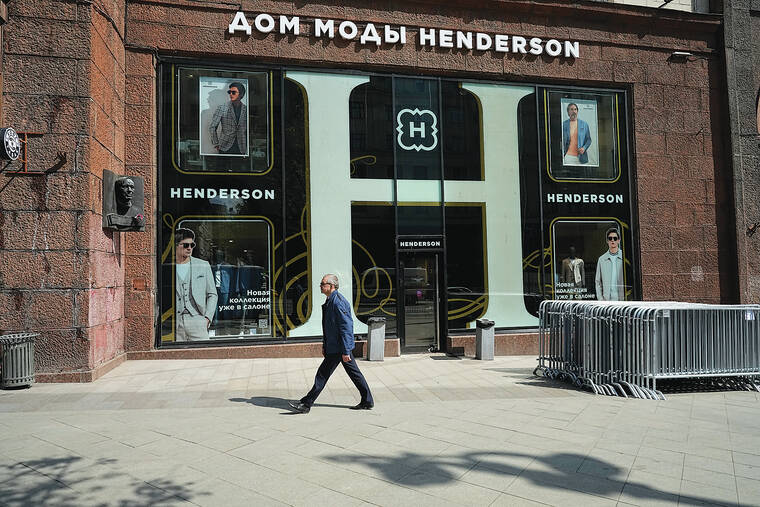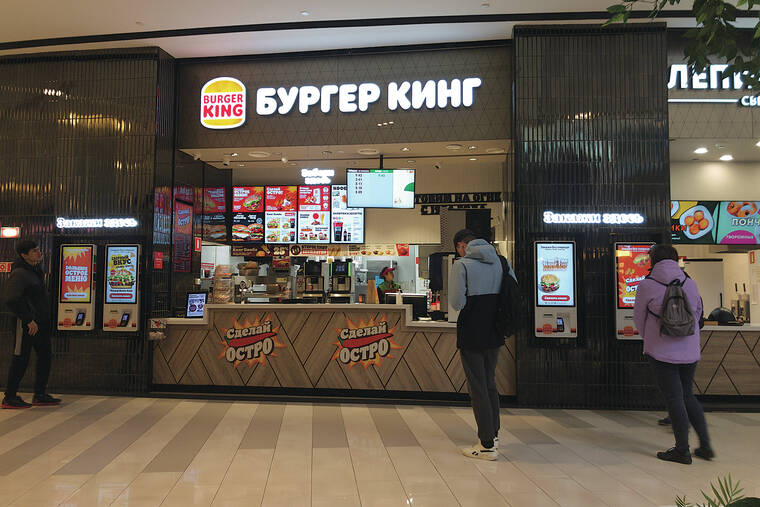Companies are finding it’s not so simple to leave Russia. Some are quietly staying put
When Russia invaded Ukraine, global companies were quick to respond, some announcing they would get out of Russia immediately, others curtailing imports or new investment. Billions of dollars’ worth of factories, energy holdings and power plants were written off or put up for sale, accompanied by fierce condemnation of the war and expressions of solidarity with Ukraine.
More than a year later, it’s clear: Leaving Russia was not as simple as the first announcements might have made it seem.
Increasingly, Russia has put hurdles in the way of companies that want out, requiring approval by a government commission and in some cases from President Vladimir Putin himself, while imposing painful discounts and taxes on sale prices.
Though companies’ stories vary, a common theme is having to thread an obstacle course between Western sanctions and outraged public opinion on one side and Russia’s efforts to discourage and penalize departures on the other. Some international brands such as Coke and Apple are trickling in informally through third countries despite a decision to exit.
Many companies are simply staying put, sometimes citing responsibility to shareholders or employees or legal obligations to local franchisees or partners. Others argue that they’re providing essentials like food, farm supplies or medicine. Some say nothing.
One is Italian fashion chain Benetton, whose store at Moscow’s now ironically named Evropeisky Mall — meaning “European” in Russian — was busy on a recent weekday evening, with customers browsing and workers tidying piles of brightly colored clothing. At Italian lingerie retailer Calzedonia, shoppers looked through socks and swimwear. Neither company responded to emailed questions.
For consumers in Moscow, what they can buy hasn’t changed much. While baby products store Mothercare became Mother Bear under new local ownership, most of the items in the Evropeisky Mall shop still bear the Mothercare brand.
That’s also what student Alik Petrosyan saw as he shopped at Maag, which now owns Zara’s former flagship clothing store in Moscow.
“The quality hasn’t changed at all, everything has stayed the same,” he said. “The prices haven’t changed much, taking into account the inflation and the economic scenarios that happened last year.”
“Overall Zara — Maag — had competitors,” Petrosyan said, correcting himself, “but I wouldn’t say that there are any now with whom they could compete equally. Because the competitors who stayed are in a higher price segment, but the quality doesn’t match up.”
The initial exodus from Russia was led by big automakers, oil, tech and professional services companies, with BP, Shell, ExxonMobil and Equinor ending joint ventures or writing off stakes worth billions. McDonald’s sold its 850 restaurants to a local franchisee, while France’s Renault took a symbolic single ruble for its majority stake in Avtovaz, Russia’s largest carmaker.
Since the initial wave of departures, new categories have emerged: companies that are biding their time, those struggling to shed assets and others attempting business as usual. Over 1,000 international companies have publicly said they are voluntarily curtailing Russian business beyond what’s required by sanctions, according to a database by Yale University.
But the Kremlin keeps adding requirements, recently a “voluntary” 10% departure tax directly to the government, plus an understanding that companies would sell at a 50% discount.
Putin recently announced that the government would take over the assets of Finnish energy company Fortum and Germany’s Uniper utility, barring a sale with an eye to offsetting any Western moves to seize more Russian assets abroad.
Danish brewer Carlsberg announced its intention to divest its Russia business — one of Russia’s largest brewing operations — in March 2022 but faced complications clarifying the impact of sanctions and finding suitable buyers.
“This is a complex process, and it has taken longer than we originally hoped for” but now is “almost completed,” said Tanja Frederiksen, global head of external communications.
She called the Russia business a deeply integrated part of Carlsberg. Separating it has involved all parts of the company and more than 100 million Danish kroner ($14.8 million) in investment in new brewing equipment and IT infrastructure, Frederiksen said.
Another beer giant, Anheuser-Busch InBev, is trying to sell a stake in a Russian joint venture to Turkey-based partner Anadolu Efes and has forgone revenue from it.
Companies are lost in “a Bermuda Triangle between EU sanctions, U.S. sanctions and Russia sanctions,” said Michael Harms, executive director of the German Eastern Business Association.
They must find a partner not sanctioned by the West. In Russia, major business figures are often people who are “well connected with the government,” Harms said. “For one thing, they have to sell at a large discount or almost give assets away, and then they go to people whom politically we don’t like — people who are close to the regime.”
The 10% exit tax mandated by Russia is particularly tricky. American companies would have to get permission from the Treasury Department to pay it or run afoul of U.S. sanctions, said Maria Shagina, a sanctions expert at the International Institute for Strategic Studies in Berlin.
Hundreds of companies quietly decided not to leave.
In a rare, frank explanation, Steffen Greubel, CEO of German cash and carry firm Metro AG, said at this year’s shareholder meeting that the company condemns the war “without any ifs, ands or buts.”
However, the decision to stay was motivated by a responsibility for 10,000 local employees and is “also in the interest of preserving the value of this company for its shareholders,” he said.
Metro gets around 10% of its annual sales from Russia — more than 2.9 billion euros ($3.1 billion).
Meanwhile, shelves are just as full as before the war at Globus superstores, a Germany-based chain with some 20 locations operating in Moscow.




